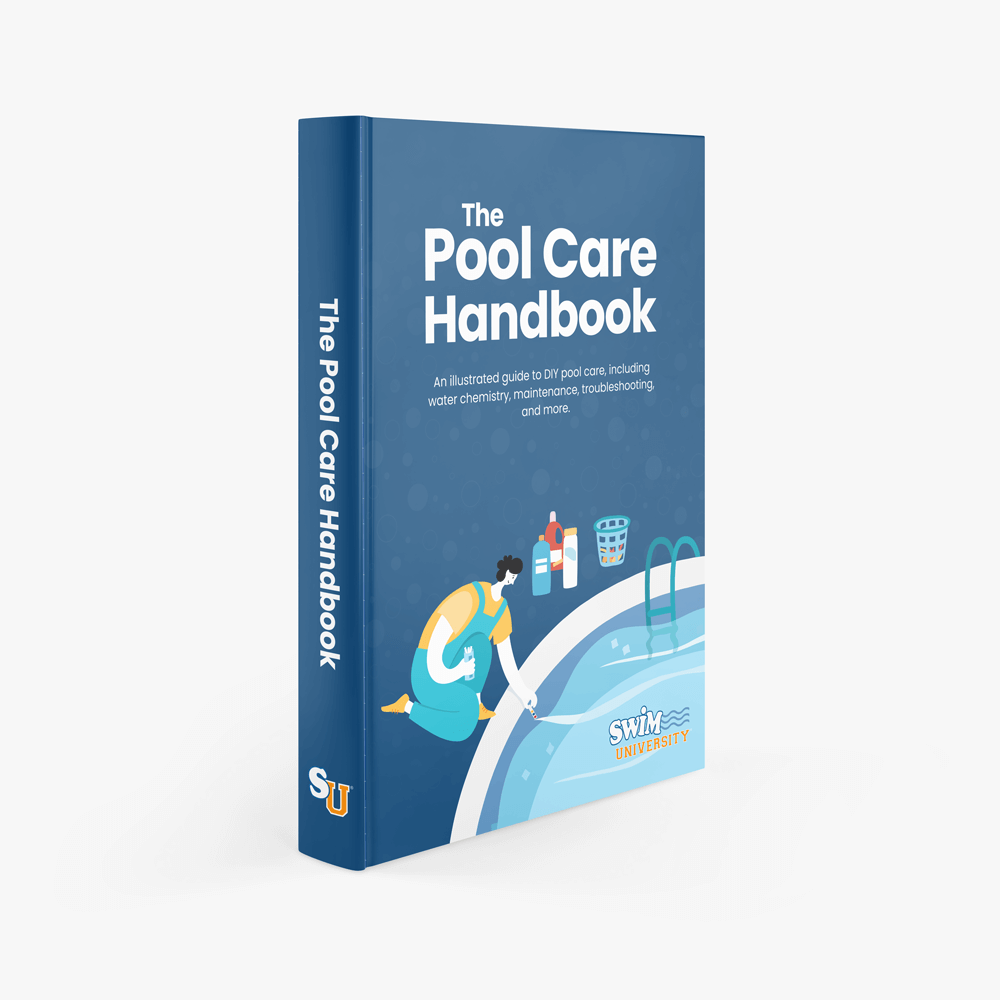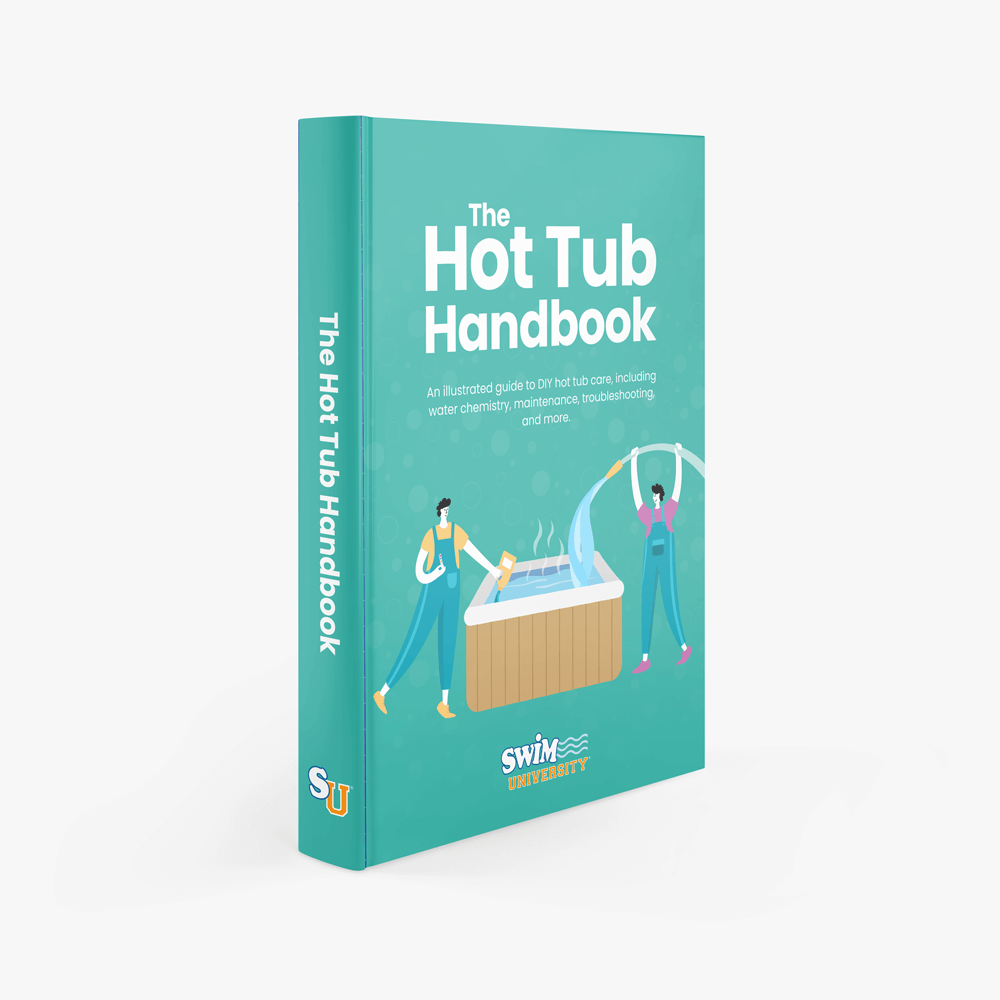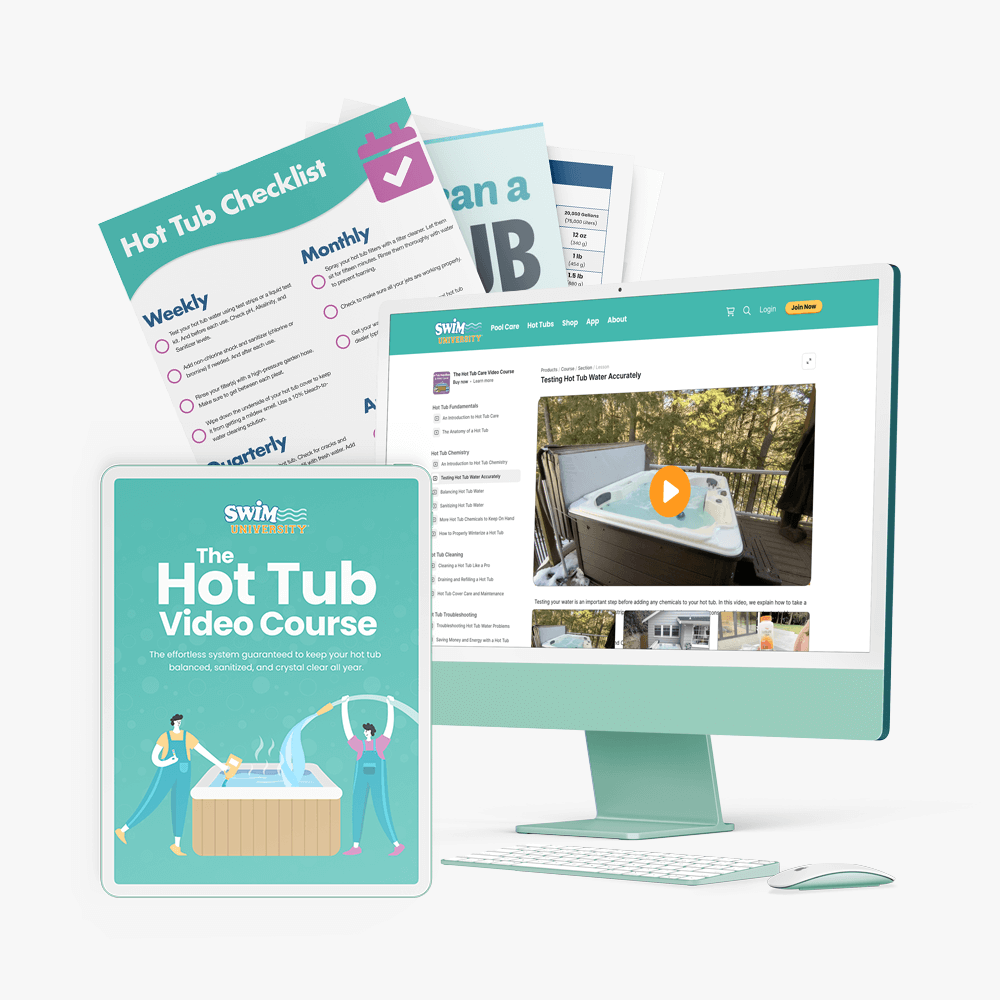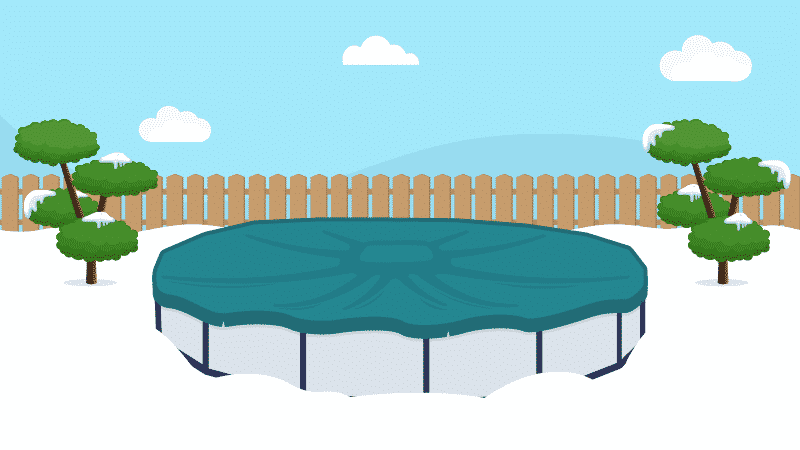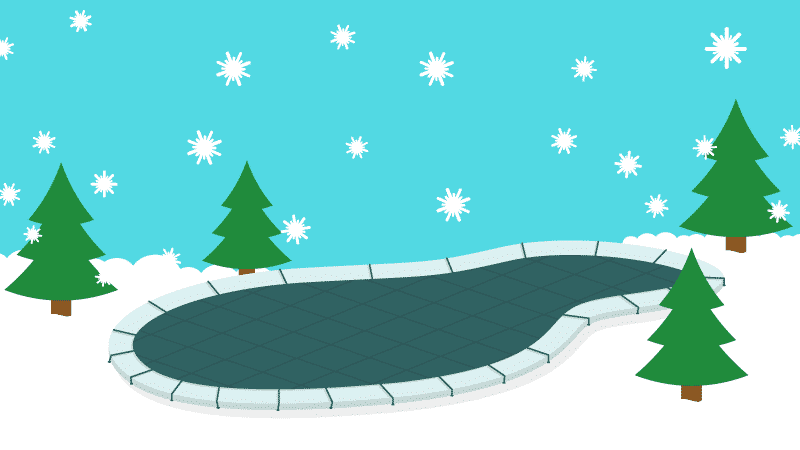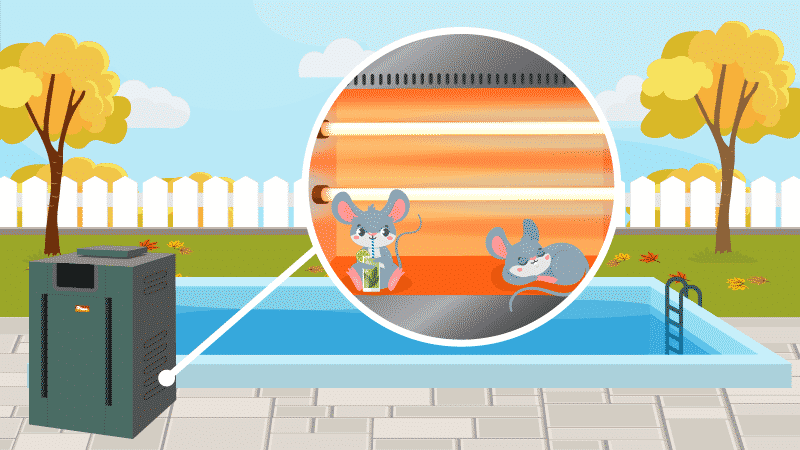11 Off Season Pool Care Tips
Unfortunately, pool maintenance doesn’t end when swimming season does. It’s important to continue caring for your swimming pool during the winter months to ensure a successful and clean pool opening.
I put together a list of maintenance tips every pool owner can use during the colder months. You can read the tips, listen to the podcast (at the end of this article), or watch the video below. 👇
Stop wasting time and money with confusing water chemistry and maintenance. Our effortless system guarantees to keep your pool balanced, sanitized, and crystal clear all year. Works for all pools including saltwater.
1. Add a Midwinter Algaecide
If you want to help prevent algae from growing in your pool water, use an algaecide. Algae do not grow in freezing temperatures. But if you have a series of warm days after pool closing, it might happen. I recommend using an algaecide that stays in the water for a good length of time.
On the last day of operation, add this to the water and run the pump for 24 hours to fully circulate. Then, shut down the circulation system for the winter. By keeping the green stuff away as long as possible, pool startup will be much easier.
Note: You can also add this under your cover any time during the winter months if you’re worried about algae growth. The algaecide I recommend doesn’t kill existing algae, but it keeps it from growing. 👇
A copper-free algaecide to help prevent your pool from turning green.
2. Check Your System to Prevent Freezing
Check your pool equipment (if they’re still outside). Make sure the water is draining from the pump, pool heater, and filter. All of the drain plugs on these parts should have been removed. This allows any rainwater or condensation build-up to drain out.
You also want to drain the water 4–6 inches below the pool skimmer. Any excess water in these pool accessories can freeze. If that happens, the pipes can crack, which can cost serious money in the long run.
Remember to also completely remove any water that has accumulated on top of your pool cover to keep it from freezing. You can use a sump pump or a winter cover pump.
3. Keep Your Pool Cover Clean All Winter Long
You should absolutely have a winter cover for your pool. A dirty but safely covered pool beats a sparkling clean but uncovered pool any time. There simply is no better insurance for keeping toddlers and wildlife out of the pool.
If possible, keep the water level where it’s supposed to be and the pumps running.
If leaves, sticks, and other junk accumulate on your pool cover throughout the winter, you can end up with a nasty stew of stagnant water, which is a mess to remove, and some of it often ends up in the pool.
Using an air pillow in the center of the pool protects your pool from snow and ice damage. It also disperses water and debris to the sides of the pool, making cleaning easier. You want to keep some water on the cover to help stabilize the cover in the wind, but you don’t want any debris.
4. Add Chlorine to Your Pool to Ensure a Clean Opening
We recommend a few things if you have a safety cover on your pool:
- In the fall, make sure to add chlorine and algaecide to your pool for over the winter. Don’t add too much chlorine though. If the chlorine level is too high over the winter, you can bleach the liner
- As soon as the water thaws in the spring, pop open a corner of the cover and add liquid chlorine to the pool (1–2 gal. for an average in-ground pool). You can do this yourself, or hire a professional to do this for you. This is the most important step.
- When your pool is opened, vac on waste to help remove the debris from the bottom of the pool. If you try to vac the sediment from the bottom of the pool and run it through the filter system, you may find that the sediment is so fine that it goes right through your filter.
- If you find your pool is pea-soup green in the spring, add more liquid chlorine, allow your filter to do its work, and monitor the progress. Be patient. If you don’t see progress in several hours, repeated doses of chlorine and algaecide may be in order, and your pool may benefit from an extra vacuum session.
This fast-acting, quick-dissolving swimming pool shock kills bacteria, controls algae, and destroys organic contaminants in pools.
5. Check Your Pool Cover to Make Sure It’s Properly Fitted
Having clean, clear water in the spring makes your life much easier. One key element in achieving that is a properly fitted safety cover. It your pool cover doesn’t fit, it’s an invitation for dirt, debris, and even small animals to find their way into your pool.
Periodically check your cover cable to make sure it’s tight. If the cable becomes loose, the cover might start to slip into the pool.
Check your air pillow to make sure it still has air in it. If you see it starting to go flat, get another one, slip it under the cover, and blow it up.
6. Pay Attention To The Weather
If the fall has been mild and warm, it’s a good idea to check the pool and add more chlorine and algaecide just before the colder season.
If you live in an area that has heavy rains in the fall and you use a mesh cover, much of the winterizing chemicals you use may become diluted. Then, just before the first big freeze hits, charge up the chemicals to help ensure the water makes it through to spring startup without an algae bloom.
7. Use Enzyme Chemicals to Break Down Non-Living Organic Contamination
Using an enzyme product during off season pool care (even poured through a mesh cover when the water is not frozen) will help to break down non-living organic contamination that will inevitably make its way into your pool during winter. Some of this contamination includes bird droppings, pollen, or even bather contaminants left over from your pool season.
An off-season enzyme will help prevent the waterline ring that can occur through the winter, which would normally require a lot of scrubbing in the spring.
Effectively eliminates scum lines and waterline buildup, ensuring your pool water stays clear and sparkling.
8. Protect The Water and Open Early
Use a winterizing product in the water that has some biocidal properties to slow or prevent microorganism growth. The principles you follow in the summer also apply to the winter. If you can maintain proper pH sanitizer levels at all times, pool care becomes easier.
The challenge in cold environments is that water is not being circulated, the pool is covered, and a typical sanitizer like chlorine will degrade and disappear during the long winter. This is why many winterization products include algaecides that are stable and will stay in the water for extended periods of time. Most algaecides will survive the winter and slow or stop algae growth; some of these products may even slow bacterial growth.
Also, open the pool before the water gets too warm. If you wait until later in the spring to open the pool, you’ll likely have more algae growing in the pool.
9. Clean Your Pool Surfaces
Regularly cleaning the walls, floors, and other surfaces of the pool is essential to prevent the growth of algae. Developing the habit of skimming, vacuuming, and brushing away organic debris on a weekly basis during the off-season will save you time and effort in dealing with murky and green water when spring arrives.
Remember to pay attention to hard-to-reach areas, such as behind ladders, steps, and corners, when brushing the pool.
10. Remove Debris From Your Pool Equipment
To maintain cleanliness and ease maintenance in the future, ensure that skimmer baskets, pump baskets, floor cleaner containers, and cleaner bags are cleared out. Regularly emptying these areas will prevent debris buildup and keep both the water and equipment in better condition.
11. Keep An Eye On Your Pool Water Level
Ensure that your pool maintains the appropriate water level to safeguard your pump and maintain pool priming. The ideal water level for your pool may vary based on your climate. In warmer areas without freezing temperatures, the pool water should be nearly filled to the top during winter.
Conversely, in colder regions, the pool water should be maintained four to six inches below the skimmer during winter months. Devoting a small amount of time each week to off-season pool maintenance will greatly benefit the process of opening your pool in the upcoming spring and summer seasons.
Frequently Asked Questions About Winter Pool Maintenance
I asked our community of pool owners if they had any questions about taking care of their pool during the off-season (fall and winter).
Do I need to add chemicals to my pool in the winter?
No, you don’t NEED to, but I recommend adding algaecide and enzymes to your pool in the winter to maintain water quality and prevent algae growth.
Should you use chlorine tablets in the winter?
You can use chlorine tablets in the winter to prevent algae growth. There are plastic chlorine floaters that you can keep under the cover. They will dissolve slowly throughout the water. But do not use chlorine tablets if you have a vinyl liner or fiberglass pool because you risk bleaching.
How do I clean my pool at the end of the season?
Remove any debris, leaves, or twigs from the pool using a skimmer net. Vacuum the pool to remove any dirt or sediment at the bottom. Brush the walls and floor of the pool to loosen any algae or buildup.
Backwash and clean the pool filter to remove any trapped dirt or contaminants. Test and balance the pool water chemistry, adjusting pH, alkalinity, and sanitizer levels if necessary.
Shock the pool with a chlorine or non-chlorine shock treatment to kill bacteria and algae. Run the pool pump for 24 to 48 hours to circulate the chemicals and ensure proper filtration. Cover the pool with a sturdy pool cover to protect it during the off-season.
4 Ways We Can Help With Your Pool
- Pool Care Cheat Sheets (Free): Easy-to-use downloadable guides to help you keep track of taking care of your pool this year.
- The Pool Care Handbook: An illustrated guide to DIY pool care, including water chemistry, maintenance, troubleshooting, and more.
- The Pool Care Video Course: You’ll get 30+ step-by-step videos and a downloadable guide with everything you need to know about pool maintenance.
- The Pool Care App: Enter your water test results. Get a custom treatment plan. Know exactly what chemicals to add to keep your pool clear.






